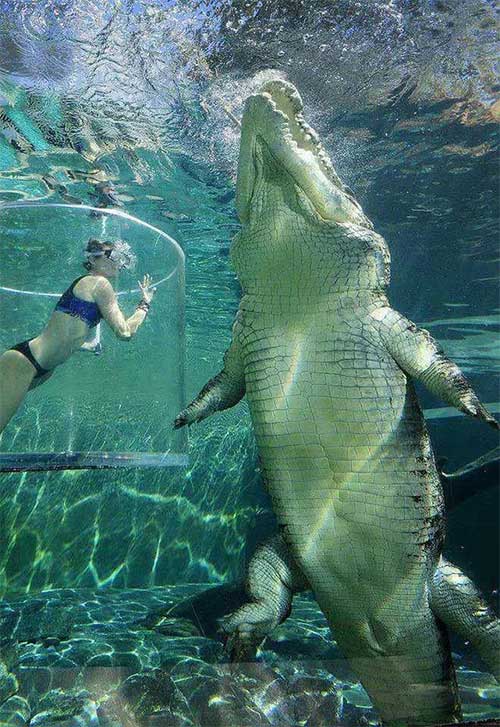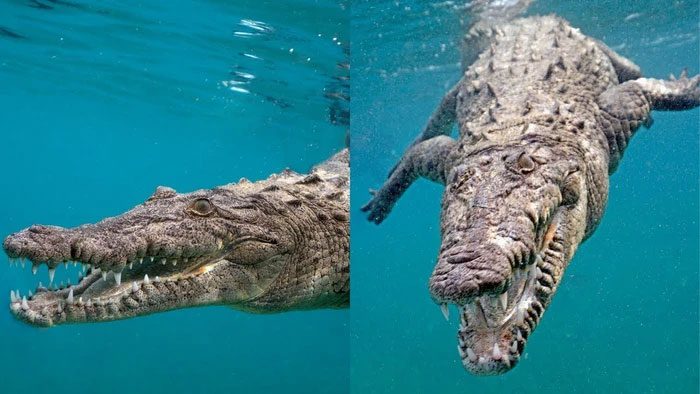The great white shark and the saltwater crocodile are two of the top predators living in the ocean and wetland areas. They are extremely dangerous animals with powerful bites and incredible muscular strength.
In nature, although the habitats of the great white shark and the saltwater crocodile may overlap to some extent, they generally do not encounter each other very often. But if these two species could be arranged to confront each other, which one would emerge victorious? Would it be the great white shark or the saltwater crocodile?
Great White Shark
The scientific name of the great white shark is Carcharodon carcharias, and it is one of the most dangerous predators in the ocean, second only to the orca.
The great white shark is a species of cartilaginous fish, with a body length of about 4 to 5 meters, and the largest individuals can reach 5.4 meters, weighing up to 4,000 kg. Their teeth are extremely sharp, allowing them to tear into large prey with ease.
At the same time, great white sharks have highly developed eyesight and sense of smell, enabling them to track prey and strike with lightning speed. In the natural world, great white sharks are apex predators in the marine food chain, and essentially, they have no natural enemies aside from orcas.

The great white shark is one of the most dangerous predators in the ocean.
The great white shark, also known by other names such as white pointer, white death, or simply white shark, is a large shark species belonging to the order Lamniformes found in coastal regions across the oceans.
Saltwater Crocodile
The saltwater crocodile is the largest living reptile in the world today, inhabiting swamps, lakes, coastal areas, and tidal regions in tropical and subtropical climates. This giant reptile is physiologically adapted to high salinity water. The saltwater crocodile is also known for its longevity, with an average lifespan of over 60 years.
Modern saltwater crocodiles are the only species in the crocodilian order that lack large scales on the back of their necks, and they are often referred to as “naked-necked crocodiles.” They are similar to dinosaurs, typically reaching lengths of 6-7 meters and can weigh over 2 tons.
Their skin is gray or brown with rough textures and may have black or yellow spots. Saltwater crocodiles have strong limbs and sharp teeth, allowing them to easily bite and capture their prey.
Saltwater crocodiles are carnivorous animals that primarily feed on fish, birds, and mammals. They have a strong territorial instinct and often occupy specific territories.

The saltwater crocodile is the largest living reptile in the world today.
The saltwater crocodile, also known as the estuarine crocodile or in Vietnam as the Siamese crocodile, is the largest subspecies of crocodile and also the largest living reptile in the world.
Comparison Between the Great White Shark and Saltwater Crocodile
The great white shark swims very fast, with swimming speeds reaching over 60 km/h. When hunting, the great white shark approaches its prey at high speed and tears it apart with its sharp teeth.
Due to their keen sense of smell, great white sharks can detect the presence of prey from afar and quickly close in on it. Additionally, great white sharks are solitary animals that typically hunt alone and do not cooperate with other individuals.

The great white shark primarily hunts fish, other sharks, and marine creatures in the ocean.
In contrast, crocodiles are very dangerous animals; they attack very quickly and can subdue their prey in a short time. When hunting, crocodiles are also very cautious, often lurking underwater, waiting for prey to come close before biting into the neck or head of their target. After subduing their prey, crocodiles will drag it ashore to enjoy.
The great white shark and the saltwater crocodile inhabit very different ecological environments. The great white shark lives in the depths of the ocean and usually hunts alone for prey in the sea.
Saltwater crocodiles prefer to inhabit swamps, river mouths, and coastal areas where freshwater and seawater mix, and they can survive both on land and underwater. Due to these differences in habitat, the prey encountered by the two species also differs.
The great white shark primarily hunts fish, other sharks, and various marine creatures in the ocean, while saltwater crocodiles mainly hunt wading birds, fish, reptiles, and mammals.

Crocodiles are certainly stronger in terms of size and bite force ratio.
Which Species Would Win?
Biologically, crocodiles are definitely stronger in terms of size and bite force ratio. Their teeth and muscles are very strong, with a bite force reaching up to 3,510 kg, capable of easily killing large animals. In contrast, the bite force of the great white shark is much weaker, at around 1,857 kg.
The attack speed of crocodiles is very fast, allowing them to subdue prey quickly and drag it ashore to enjoy. Additionally, the skin of crocodiles is very tough and has excellent puncture resistance, effectively protecting them from attacks. Although great white sharks have powerful attacks, their skin is relatively thin and very susceptible to injury.
Furthermore, the attacking styles of these two animals are also very different. While great white sharks primarily attack prey by biting, crocodiles use their sharp teeth and a death roll to capture their prey.
Great white sharks and saltwater crocodiles have different biological advantages, with crocodiles having a stronger bite, faster attack speed, and greater agility. If these two animals faced off against each other, the crocodile would have a higher chance of winning.


















































